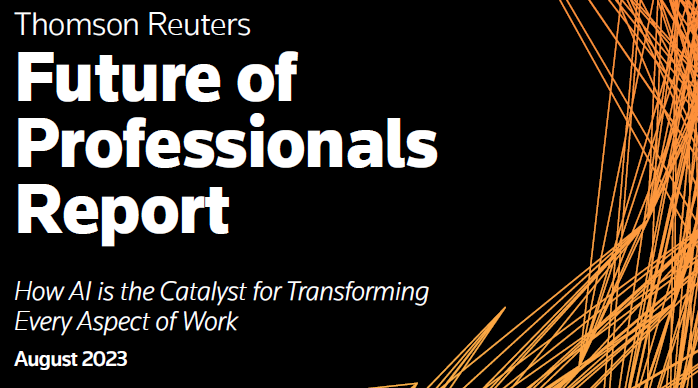Future of Professionals Report: Legal Professionals’ Optimism and Wariness Around AI

Our Future of Professionals Report reflects our history of partnering with legal professionals and our commitment to applying innovative technology that helps our customers better serve their clients.
The report surveyed more than 1,200 professionals in legal, tax and accounting, global trade, and risk and compliance industries. Legal professionals’ perspectives in the report are what I anticipated based on what I’ve learned talking with our customers about their expectations for – and concerns with – AI and generative AI.
As we work to integrate generative AI into our legal solutions, we’re collaborating closely with customers to make sure we’re solving their biggest pain points and enabling them to focus their time where it matters most. Our customer-driven approach to developing generative AI tools follows how we created groundbreaking innovations like Westlaw Precision, Quick Check, and Practical Law Dynamic Tool Set, among others.
The report findings reinforced what we’re hearing from our customers: Legal professionals are generally optimistic about the potential for AI.
It’s encouraging that 55% of legal professionals expect using AI to lower costs for firms and drive greater firm profitability. Law firms anticipate using AI-powered tools to drive growth through increased productivity, reduced costs, and improved client service.
Law firms also believe AI will create new revenue streams; 81% of legal professionals expect AI to lead to new advisory services within the next five years. AI could help firms expand into new markets as well as drive efficiencies with tools that streamline client intake and automate contract drafting, for example.
And in-house counsel are looking to AI to achieve greater efficiency; 48% ranked efficiency as a top priority, while 39% said reducing external spend was a priority. I continually hear from in-house counsel about the importance of controlling their legal spend. They’re eager to see how AI can help them increase internal capacity and reduce outside spend without adding staff.
Yet legal professionals’ optimism is tempered by concerns.
While 66% of professionals believe AI will create new career paths, they also worry that AI could lead to job cuts. It’s a valid concern. But I see opportunities ahead – particularly for individuals willing to learn new skills.
For those who expand their skillsets into areas including software coding and AI prompt engineering, AI will likely open up more career paths. Lawyers and legal professionals who adapt to embrace AI are going to be best positioned to use it to their advantage – improving their personal productivity as well as enhancing their career growth.
Another issue, cited by 30% of legal professionals in the report, is accuracy of AI outputs. It’s a concern we share at Thomson Reuters.
It’s why we’re using our proprietary data to develop our AI-powered solutions. We will deliver verified citations to support all of the outputs, and our process is guided by human subject matter experts who understand the nuances and the context to train and finetune results. My colleague Joel Hron, vice president of Technology, has shared how Thomson Reuters is ensuring that our generative AI solutions will deliver trustworthy and accurate results.
Overall, my takeaway from the report is that legal professionals are looking past the hype around AI and generative AI. They’re aware that the legal industry has to put in the work to develop trustworthy AI solutions that will help strengthen productivity and increase firm profitability. And they’re excited – as am I – about the progress made as well as for what’s to come. I look forward to continuing to partner with and learn from our customers as we redefine legal work with the power of generative AI.
This is a guest post from Paul Fischer, president of the Thomson Reuters Legal business.